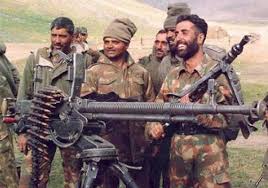"General Asim Munir Reveals Active Role in 1999 Kargil War: What This Historic Admission Means for Pakistan-India Relations"
LATEST NEWS


"Discover the groundbreaking revelation by Army Chief General Asim Munir about his active role in the 1999 Kargil War against India. This historic admission sheds new light on the Kargil conflict, impacting military strategies and Pakistan-India relations. Read our in-depth analysis to understand the implications of this pivotal disclosure and its significance in the context of South Asian geopolitics."
General Asim Munir Breaks Silence: The Untold Story of His Role in the 1999 Kargil War
In a historic revelation that has captured national and international attention, Army Chief General Asim Munir has admitted his active involvement in the 1999 Kargil War against India. This groundbreaking disclosure offers a fresh perspective on one of the most contentious military conflicts of the late 20th century. In this blog, we delve into the significance of General Munir’s admission, its implications for contemporary military strategy, and the broader impact on Pakistan-India relations.
A Landmark Admission: General Asim Munir’s Role in the Kargil Conflict
In a recent statement that has ignited a flurry of discussions across media platforms, General Asim Munir, the current Chief of Army Staff of Pakistan, has for the first time publicly acknowledged his active participation in the 1999 Kargil War. This revelation is not merely a historical footnote but a pivotal moment that sheds light on the intricacies of the conflict and the strategic decisions made during one of South Asia's most intense military engagements.
The Kargil War: A Brief Overview
The Kargil War fought between May and July 1999, was a high-altitude conflict between India and Pakistan. It was centred around the Kargil district of Jammu and Kashmir, with both nations vying for control over strategic positions in the region. The war resulted in significant casualties and had far-reaching implications for both country's military strategies and diplomatic relations.
General Asim Munir: A Key Player in a High-Stakes Conflict
General Munir's admission highlights his role when Pakistan's military strategies were under intense scrutiny. As the conflict unfolded, Munir was a rising officer in the Pakistan Army, and his involvement provided new insights into the operational decisions and the challenges faced by the military leadership of the time.
Keywords: General Asim Munir Kargil War, 1999 Kargil War, Pakistan-India conflict, Kargil War revelations, Pakistan Army Chief admission
Implications of the Admission
1. Re-evaluation of Military Strategies
General Munir's acknowledgement prompts a re-evaluation of the strategies employed during the Kargil War. Analysts and historians now have access to first-hand accounts that could alter the prevailing narratives about the conflict. This new perspective may lead to a reassessment of the strategic decisions and their impact on the outcome of the war.
2. Impact on Pakistan-India Relations
The revelation also has potential implications for Pakistan-India relations. As both nations continue to navigate their complex bilateral relationship, understanding the historical context and the roles played by key figures can influence diplomatic efforts and public perceptions.
3. Public and Historical Insight
For the public, General Munir’s disclosure provides a deeper understanding of the Kargil War, moving beyond the official narratives and media portrayals. It adds a personal dimension to the historical account, enriching the broader discourse on South Asian geopolitics.
Keywords: Kargil War impact, Pakistan-India relations, historical insights, military strategy, General Asim Munir's role
The Path Forward: Analyzing the Broader Context
General Munir admission serves as a catalyst for a broader discussion on military transparency and historical accuracy. As we move forward, it is crucial to analyze how such revelations shape our understanding of past conflicts and their influence on present-day military and diplomatic strategies.
Conclusion
The admission by Army Chief General Asim Munir about his role in the 1999 Kargil War is a monumental development in the ongoing narrative of South Asian military history. It not only enhances our understanding of the Kargil conflict but also opens new avenues for discussion on military strategy and international relations. As we reflect on this significant disclosure, it is important to continue exploring and questioning the complexities of historical events to foster a more informed and nuanced perspective.
Stay Tuned
For more updates on military history, strategic analyses, and geopolitical insights, follow our blog. We provide in-depth coverage of the latest developments and historical revelations that shape our world.
Keywords: military history, strategic analyses, geopolitical insights, South Asian conflicts, Kargil War coverage
By keeping informed and engaged, we contribute to a more comprehensive understanding of the past and its impact on the present.
